Now Playing: Lietta Ruger at Washblog
Topic: Media Involvement
Any Reason to Keep Funding Iraq invasion/occupation?
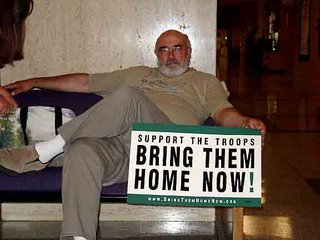
Arthur Ruger, my veteran husband, taking a position at Veterans for Peace conference, Seattle, WA, Aug 12, 2006.
-- 172nd Stryker Brigade extended in stop loss, sent to Baghdad after a year deployment in Iraq. July 27, 2006 (Read backdoor draft of involuntary service, involuntary military) Many were on their way home, actually arrived home after a year in Iraq, only to be turned back and sent to Baghdad in a stop-loss extension. This happened in our family also back in April 2004; 1st Armored was to come home in April 2004, after a year in Iraq. They were extended, stop lossed at very last minute and our two, who were with 1st Armored - we had homecoming plans in the works - were kept in Iraq an additional 3 months due to Sadr City uprising.
Bring Home 172nd Stryker Brigade a non-political, non agenda website intended only to permit families of 172nd Stryker to express their thoughts and feelings. Why is it valuable? It reflects some of the military families who hold more traditional military culture views and in exhaustion are beginning to speak out - not by joining an organization, but some of the stories written by the families speak to how fragile the military families are feeling at this point in history.
-- U.S. military calling back troops who've been out of uniform for years Aug 20, 2006 Marines, IRR (Individual Ready Reserves) being called up to deploy to Iraq - as many as 20,000. (whisper; pre-curser to an all out military draft?)
-- Fort Lewis soldier killed Aug 23, 2006 - Stryker Brigade, 3rd Brigade, 2nd Infantry Division,out of Fort Lewis, recently redeployed to Iraq in second deployment, June 2006
-- Article; 7 Facts Making Sense of Our Iraq Disaster Aug 20, 2006
Any reason not to authentically support our troops by bringing them home Now and stop funding the Iraq invasion/occupation Now - before November elections? Senators, Representatives, Congress, Washingtonians, People?
read more on the flip..
It doesn't look at all like a troop call down in Iraq; quite the opposite. So much for transition in 2006, when Iraqis stand up, troops can stand down. Oh, that's not the Dem position anymore is it? Now it's something like 'it might have been a mistake'. Courageous people like Ned Lamont change the political playing field in taking an absolute stand - gee, and he wins the election! There is a message there, not unlike the message I've been trying to put forth here at Washblog for months....
Article; 7 Facts Making Sense of Our Iraq Disaster by Michael Schwartz, Aug 20, 2006
1. The Iraqi Government Is Little More Than a Group of "Talking Heads"
-- A minimally viable central government is built on at least three foundations: the coercive capacity to maintain order, an administrative apparatus that can deliver government services and directives to society, and the resources to manage these functions. The Iraqi government has none of these attributes -- and no prospect of developing them.2. There Is No Iraqi Army
-- The "Iraqi Army" is a misnomer. The government's military consists of Iraqi units integrated into the U.S.-commanded occupation army. These units rely on the Americans for intelligence, logistics, and -- lacking almost all heavy weaponry themselves -- artillery, tanks, and any kind of airpower. (The Iraqi "Air Force" typically consists of fewer then 10 planes with no combat capability.) The government has no real control over either personnel or strategy.3. The Recent Decline in American Casualties Is Not a Result of Less Fighting (and Anyway, It's Probably Ending)
-- At the beginning of August, the press carried reports of a significant decline in U.S. casualties, punctuated with announcements from American officials that the military situation was improving. The figures (compiled by the Brookings Institute) do show a decline in U.S. military deaths (76 in April, 69 in May, 63 in June, and then only 48 in July). But these were offset by dramatic increases in Iraqi military fatalities, which almost doubled in July as the U.S. sent larger numbers of Iraqi units into battle, and as undermanned American units were redeployed from al-Anbar province, the heartland of the Sunni insurgency, to civil-war-torn Baghdad in preparation for a big push to recapture various out-of-control neighborhoods in the capital.4. Most Iraqi Cities Have Active and Often Viable Local Governments
-- Neither the Iraqi government, nor the American-led occupation has a significant presence in most parts of Iraq. This is well-publicized in the three Kurdish provinces, which are ruled by a stable Kurdish government without any outside presence; less so in Shia urban areas where various religio-political groups -- notably the Sadrists, the Supreme Council of Islamic Revolution in Iraq (SCIRI), Da'wa , and Fadhila -- vie for local control, and then organize cities and towns around their own political and religious platforms. While there is often violent friction among these groups -- particularly when the contest for control of an area is undecided -- most cities and towns are largely peaceful as local governments and local populations struggle to provide city services without a viable national economy.5. Outside Baghdad, Violence Arrives with the Occupation Army
-- The portrait of chaos across Iraq that our news generally offers us is a genuine half-truth. Certainly, Baghdad has been plunged into massive and worsening disarray as both the war against the Americans and the civil war have come to be concentrated there, and as the terrifying process of ethnic cleansing has hit neighborhood after neighborhood, and is now beginning to seep into the environs of the capital.However, outside Baghdad (with the exception of the northern cities of Kirkuk and Mosul, where historic friction among Kurd, Sunni, and Turkman has created a different version of sectarian violence), Iraqi cities tend to be reasonably ethnically homogeneous and to have at least quasi-stable governments. The real violence often only arrives when the occupation military makes its periodic sweeps aimed at recapturing cities where it has lost all authority and even presence.
6. There Is a Growing Resistance Movement in the Shia Areas of Iraq
-- read more at link article7. There Are Three Distinct Types of Terrorism in Iraq, All Directly or Indirectly Connected to the Occupation
-- read more at link articleWhere the 7 Facts Lead
With this terror triumvirate at the center of Iraqi society, we now enter the horrible era of ethnic cleansing, the logical extension of multidimensional terror.
When the U.S. toppled the Hussein regime, there was little sectarian sentiment outside of Kurdistan, which had longstanding nationalist ambitions. Even today, opinion polls show that more than two-thirds of Sunnis and Shia stand opposed to the idea of any further weakening of the central government and are not in favor of federation, no less dividing Iraq into three separate nations.
Nevertheless, ethnic cleansing by both Shia and Sunni has become the order of the day in many of the neighborhoods of Baghdad, replete with house burnings, physical assaults, torture, and murder, all directed against those who resist leaving their homes. These acts are aimed at creating religiously homogeneous neighborhoods.
This is a terrifying development that derives from the rising tide of terrorism. Sunnis believe that they must expel their Shia neighbors to stop them from giving the Shiite death squads the names of resistance fighters and their supporters. Shia believe that they must expel their Sunni neighbors to stop them from providing information and cover for car-bombing attacks. And, as the situation matures, militants on both sides come to embrace removal -- period. As these actions escalate, feeding on each other, more and more individuals, caught in a vise of fear and bent on revenge, embrace the infernal logic of terrorism: that it is acceptable to punish everyone for the actions of a tiny minority.
There is still some hope for the Iraqis to recover their equilibrium. All the centripetal forces in Iraq derive from the American occupation, and might still be sufficiently reduced by an American departure followed by a viable reconstruction program embraced by the key elements inside of Iraq. But if the occupation continues, there will certainly come a point -- perhaps already passed -- when the collapse of government legitimacy, the destruction wrought by the war, and the horror of terrorist violence become self-sustaining. If that point is reached, all parties will enter a new territory with incalculable consequences.
by Michael Schwartz, Professor of Sociology and Faculty Director of the Undergraduate College of Global Studies at Stony Brook University, has written extensively on popular protest and insurgency, and on American business and government dynamics. His work on Iraq has appeared on numerous Internet sites, including Tomdispatch, Asia Times, Mother Jones.com, and ZNet; and in print in Contexts, Against the Current, and Z Magazine. His books include Radical Protest and Social Structure, and Social Policy and the Conservative Agenda (edited, with Clarence Lo). His email address is Ms42@optonline.net.






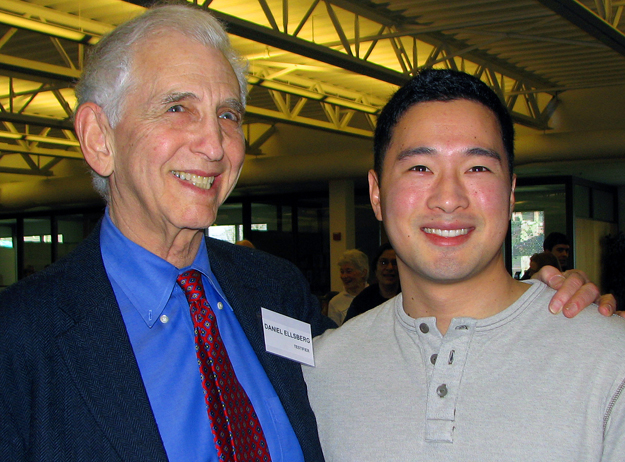
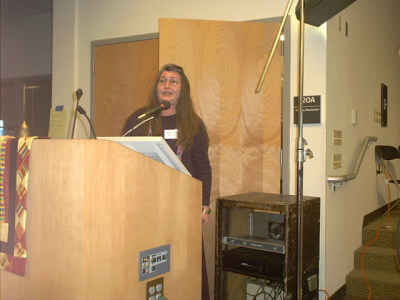
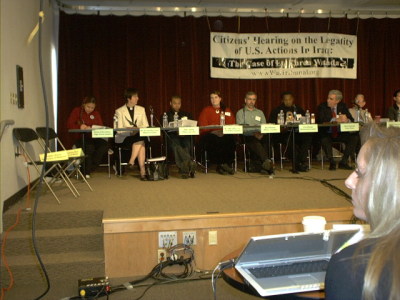 (photo - on the Panel - Elizabeth Falzone - GSFSO/ MFSO - WA chapter and Rich Moniak - MFSO - Alaska chapter listen to two days of testimony)
(photo - on the Panel - Elizabeth Falzone - GSFSO/ MFSO - WA chapter and Rich Moniak - MFSO - Alaska chapter listen to two days of testimony)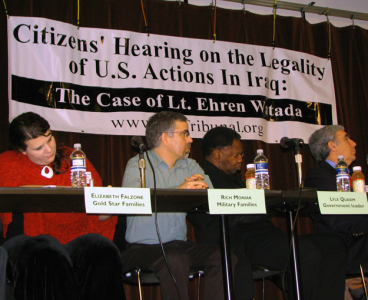


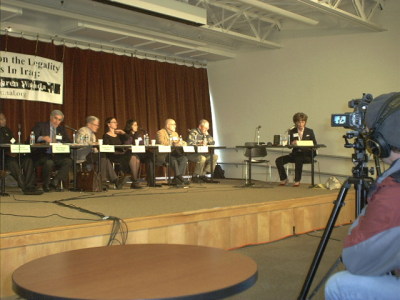 (photo - Stacy Bannerma, wife of returning Iraq veteran - WA Natl Guard, gives testimony)
(photo - Stacy Bannerma, wife of returning Iraq veteran - WA Natl Guard, gives testimony)
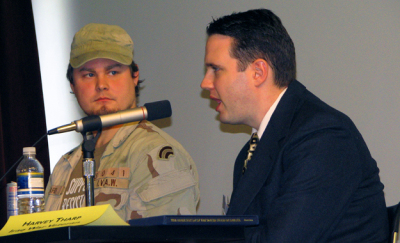
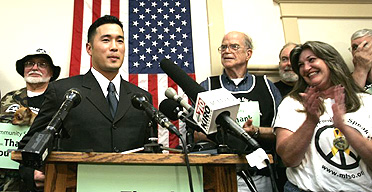 (photo Lietta Ruger, MFSO- WA, in support Lt. Ehren Watada, June 2006, Tacoma, WA)
(photo Lietta Ruger, MFSO- WA, in support Lt. Ehren Watada, June 2006, Tacoma, WA)
 (photo - Lietta Ruger, Judy Linehan, Jenny Keesey - from MFSO - WA chapter, June 2006, Tacoma, WA)
(photo - Lietta Ruger, Judy Linehan, Jenny Keesey - from MFSO - WA chapter, June 2006, Tacoma, WA) (photo - Judy Linehan, MFSO - WA at support rally for Lt. Watada, June 2006, Tacoma, WA)
(photo - Judy Linehan, MFSO - WA at support rally for Lt. Watada, June 2006, Tacoma, WA)





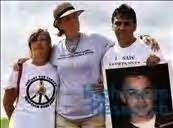
 photo - Sue Niederer, MFSO. Her son U.S. Army 2nd Lt.Seth Dvorin, 24 yrs old was killed in Iraq Feb 3, 2004.
photo - Sue Niederer, MFSO. Her son U.S. Army 2nd Lt.Seth Dvorin, 24 yrs old was killed in Iraq Feb 3, 2004. photo - Nancy Lessin, MFSO Co-Founder
photo - Nancy Lessin, MFSO Co-Founder  photo - Lietta Ruger, MFSO - WA
photo - Lietta Ruger, MFSO - WA  photo - Stacy Bannerman, MFSO - WA
photo - Stacy Bannerman, MFSO - WA





